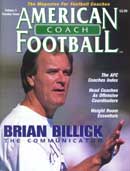AMERICAN FOOTBALL MONTHLY THE #1 RESOURCE FOR FOOTBALL COACHES
Article CategoriesAFM Magazine
|
The CommunicatorArmed with a computer and an offense for the 21st century, Brian Billick has taken Baltimore by storm.by: Mike Preston The Baltimore Sun © More from this issue He is everywhere in Baltimore. The slender face with the receding hairline and jutting jaw is on several Baltimore-area billboards or in team advertisements in national sports magazines. He has been active in the community, not selling just the Ravens, but himself. One day could include several motivational speeches that might have stops at the Baltimore Teachers Association or a high school football clinic with 200 coaches. Brian Billick has enamored fans in Baltimore. He quotes Colin Powell and Chinese philosophers. Five-syllable words roll off his tongue. The Ravens' permanent seat license sales have improved by nearly 3,000 since last season - 57,000 are now sold - and Billick is the reason why. Hired in January to replace Ted Marchibroda, Billick, 45, signed a six-year, $9 million contract as a rookie head coach in ....The full article can only be seen by subscribers.
|
|
|||||||
| HOME |
MAGAZINE |
SUBSCRIBE | ONLINE COLUMNISTS | COACHING VIDEOS |
Copyright 2026, AmericanFootballMonthly.com
All Rights Reserved





